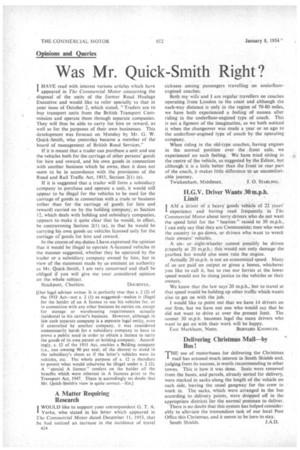Was Mr. Quick-Smith Right?
Page 58

If you've noticed an error in this article please click here to report it so we can fix it.
HAVE read with interest various articles which have I appeared in The Commercial Motor concerning the disposal of the units of the former Road Haulage Executive and would like to refer specially to that in your issue of October 2, which stated, "Traders are to buy transport units from the British Transport Commission and operate them through separate companies. They will thus be able to carry for hire or reward, as well as for the purposes of their own businesses. This development was forecast on Monday by Mr. G. W. Quick-Smith, who yesterday became a member of the board of management of British Road Services."
If it is meant that a trader can purchase a unit and use the vehicles both for the carriage of other persons' goods for hire and reward, and his own goods in connection with another business which he owns, then it does not seem to be in accordance with the provisions of the Road and Rail Traffic Act, 1933, Section 2(1) (a).
If it is suggested that a trader will form a subsidiary company to purchase and operate a unit, it would still appear to be illegal for the vehicles to be used for the carriage of goods in connection with a trade or business (other than for • the carriage of goods for hire and reward) carried on by the holding company, as Section 12, which deals with holding and subsidiary companies, appears to make it quite clear that he would, in effect, be contravening Section 2(1) (a), in that he would be carrying his own goods on vehicles licensed only for the carriage of goods for hire and reward.
in the course of my duties I have expressed the opinion that it would be illegal to operate A-licensed vehicles in the manner suggested, whether they be operated by the trader or a subsidiary company owned by him, but in view of the statement made by so eminent an authority as Mr. Quick-Smith, I am very concerned and shall be obliged if you will give me your considered opinion on thewhole subject.
Stockport, Cheshire. DOUBTFUL.
Our legal adviser writes: It is perfectly true that s. 2 (2) of the 1933 Act—not s. 2 (I) as suggested—makes it illegal for the holder of an A licence to use his vehicles for, or in connection with any other business he carries on, except for storage or warehousing requirements actually incidental to his carrier's business. However, although in law each separate company is a separate legal entity, even if controlled by another company, it was considered unnecessarily harsh for a subsidiary company to have to prove a public need in order to obtain a licence to carry the goods of its own parent or holding company. Accordingly, s. 12 of the 1933 Act, enables a ITolding company (i.e., one owning 90 per cent, of the shares) to stand in the subsidiary's shoes as if the latter's vehicles were its vehicles, etc. The whole purpose of s. 12 is therefore to permit what would otherwise be illegal under s. 2 (2). A " special A licence" confers on the holder all the benefits which were inherent in A licences prior to the Transport Act, 1947. There is accordingly no doubt that Mr. Quick-Smith's view is quite correct—Er).]




































































































